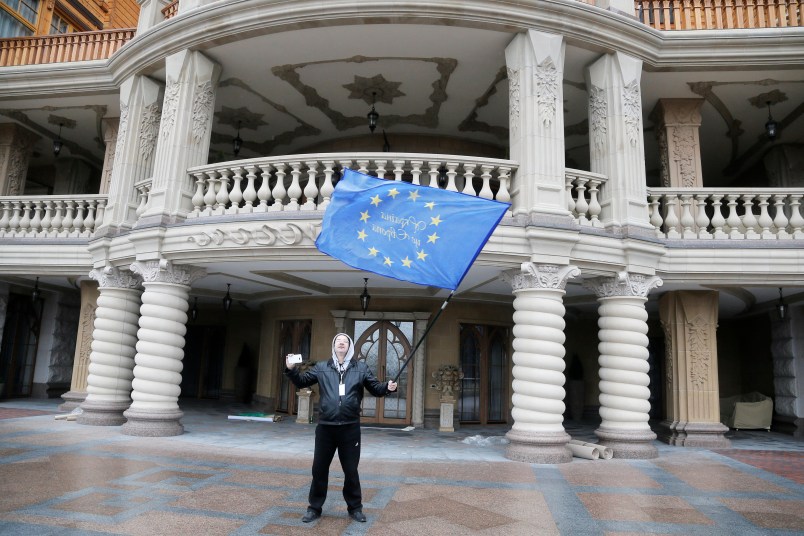BRUSSELS (AP) — The European Union suspended talks with Russia on a wide-ranging economic pact and a visa agreement Thursday in response to its military incursion into Ukraine’s Crimean Peninsula, threatening toughersanctions unless Moscow swiftly defuses the crisis.
The moves at an emergency EU summit came on the heels of sanctions by the Obama administration, which imposed visa restrictions on pro-Russian opponents of the new Ukrainian government in Kiev and cleared the way for financial sanctions.
EU President Herman Van Rompuy said further measures could include travel bans, asset freezes and the cancellation of an EU-Russia summit if Moscow does not quickly end its aggression and joins meaningful, multilateral talks within days to halt the crisis.
“We are in close coordination with the United States on this,” German Chancellor Angela Merkel said. “We cannot go back to business as usual” with Russia, she added.
However, the EU’s latest sanctions appeared weak compared to the U.S. ones and to what some more hawkishEU countries wanted, particularly those bordering Russia. Poland’s leader noted the resistance to penalizing Moscow remains fairly high among some members of the 28-nation bloc because of Europe’s close proximity, energy dependence and trade ties to Russia.
As the EU leaders met, the U.S. also sent six F-15 fighter jets to Lithuania to bolster air patrols over the Baltics, and a U.S. warship is now in the Black Sea to participate in long-planned exercises.
The sanctions on both sides of the Atlantic aimed to rein in Europe’s gravest geopolitical crisis in a generation, which developed swiftly again Thursday with Crimean lawmakers declaring their intention to split from Ukraine and join Russia instead and scheduling a referendum in 10 days for voters to decide the fate of the disputed peninsula.
Visiting the summit, Ukraine’s Prime Minister Arseniy Yatsenyuk branded the referendum illegitimate. “Crimea was, is, and will be an integral part of Ukraine,” he told reporters.
In Washington, President Barack Obama said the referendum would violate international law.
The EU put on ice talks on a wide-ranging economic agreement and on granting Russian citizens visa-free travel within the 28-nation bloc, a goal that Moscow has been pursuing for years.
The decision followed tough negotiations among member states divided over how to react to the Russian aggression.
“Not everyone will be satisfied with the decision, but I should say that we did much more together than one could have expected several hours ago,” said Polish Prime Minister Donald Tusk.
Tusk said there was “no enthusiasm” in Europe for sanctioning Russia, but he called the moves inevitable, given the country’s blatant violation of international rights by its actions in Crimea.
British Prime Minister David Cameron agreed, while acknowledging that stiffer sanctions would not only hurtRussia.
“Of course there are consequences for Britain if you look at financial services. Of course there are consequences for France if you look at defense. Of course there are consequences for some European countries if you look at energy,” he said.
But he said the EU had to take tough action to counter what he called “the most serious crisis in Europe this century.”
“If you are going to stand for something, if you’re going to stand up to aggression, you have to look at, you have to consider, all and every one of those areas.”
Merkel said if Russia fails to stop its destabilizing measures in Ukraine, “then we will see a far-reaching change in our relationship with Russia, which can also include a broad array of economic measures.”
“We don’t wish for that to happen,” she added.
Russia is Europe’s third-largest trading partner and its biggest gas and oil supplier. EU exports to Russia in 2012 totaled 123 billion euros ($170 billion), and European banks have about 200 billion euros in outstanding loans toRussia.
The Obama administration restrictions target a number of unidentified people and entities accused of threatening Ukraine’s sovereignty and borders.
And like the raft of EU measures, the U.S. sanctions are flexible: The penalties will increase if Russia continues its aggressive policies but also could be ratcheted down if Moscow pulls back its troops in Crimea and recognizes Ukraine’s new government.
The United States had already suspended talks on an investment treaty and threatened further steps. NATO on Wednesday suspended most of its meetings with Russian officials, halting military cooperation and deciding to review all aspects of its relationship with Moscow.
In a symbolic victory in the tussle over Ukraine’s future allegiances, the EU leaders agreed to swiftly sign a wide-ranging political association agreement as hoped for by Kiev’s new government, cementing closer ties with Europe.
Merkel said the agreement will now be signed “very fast,” and Cameron called it a “significant decision.” Leaders hope to sign the deal even before the Ukrainian elections planned for May.
Ukraine’s ousted President Viktor Yanukovych in November walked away from signing that agreement and chose a bailout loan package from Russia instead, which fuelled the protests that eventually led to the ouster of his government.
A free-trade part of the agreement won’t be signed yet, but the EU decided to unilaterally grant Ukraine the financial advantages deriving from it to help boost its ailing economy until the full deal can be signed.
The EU proposed a $15 billion aid package for Ukraine on Wednesday. The U.S. has pledged $1 billion and is working on a more comprehensive package, in coordination with the EU and the International Monetary Fund as Kiev is running out of cash.
Lithuanian President Dalia Grybauskaite underscored fears among Moscow’s closest neighbors as she entered the summit.
“Russia today is dangerous,” she insisted. “After Ukraine will be Moldova, and after Moldova will be different countries.”
___
Associated Press Writer Angela Charlton contributed reporting.
___
Follow Juergen Baetz on Twitter at http://www.twitter.com/jbaetz
Follow Mike Corder on Twitter at http://www.twitter.com/mcorder
Copyright 2014 The Associated Press. All rights reserved. This material may not be published, broadcast, rewritten or redistributed.






